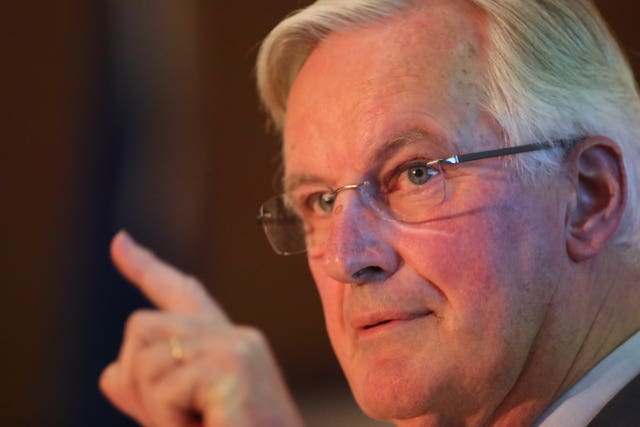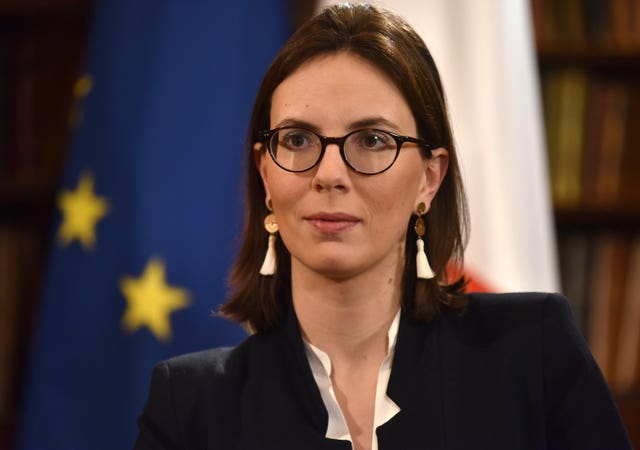The first round of post-Brexit trade talks between the UK and European Union are due to start on Monday, with the two sides well apart on a final agreement.
David Frost, the Prime Minister’s Europe adviser, and his team of negotiators will travel to Brussels to kick-start the nine-month process of vying to secure a new trade arrangement with the EU.
Both sides published their negotiation mandates last week, revealing that they are at odds over Boris Johnson’s push for a comprehensive Canada-style free trade deal, as well as demands over fishing, state subsidies and standards.
The EU’s chief negotiator Michel Barnier has said a deal like Canada’s, which would eliminate most import taxes but still require some border checks, was not suitable for Britain due to its close proximity and links to the continent.
Instead, he wants Britain to agree to sign up to a number of level-playing rules set by Brussels.
The bloc is also arguing for little to change in terms of fishing quotas and access to British waters for European boats – a continuation of the status quo that ministers in Westminster are vehemently against.
READ MORE: French minister: We will not be blackmailed by UK over post-Brexit trade
A high-level meeting to take stock of progress is scheduled for June, by which time it should be clear whether the Canada-like agreement sought by Mr Johnson is possible by the end of the year.
The EU wants to see progress on both fishing and financial services at that summer marker.
Michael Gove, the Cabinet minister responsible for Brexit preparations, said the UK would not “trade away” its “newly recovered sovereignty” during the talks.
“Our aim is to secure, through a fair and measured approach, a comprehensive free trade agreement, and also find common ground on questions such as fisheries, internal security and aviation,” said the Chancellor of the Duchy of Lancaster in an article on Sunday.
 Michel Barnier, the EU’s Brexit negotiator, has so far turned down Boris Johnson’s request for a Canada-style free trade deal (Liam McBurney/PA)
Michel Barnier, the EU’s Brexit negotiator, has so far turned down Boris Johnson’s request for a Canada-style free trade deal (Liam McBurney/PA)
“I believe we can secure a great new deal for an exciting new era.
“But it is important that we are clear from the start that these negotiations are taking place in new times.
“Yes, we want the best possible trading relationship with the EU. But we will not trade away our newly recovered sovereignty.”
French Europe minister Amelie de Montchalin warned the Prime Minister that the tight December 31 deadline would not pressure the EU 27 into agreeing fresh terms.
She told the BBC’s Andrew Marr programme: “If we need six more months we, as Europeans, are very clear that we want a good deal, a fair deal, a deal that can last for many generations to come, and we will not sign for the sake of having a deal. It would make no sense.”
The outbreak of coronavirus is said to be complicating cross-Channel relations as negotiators prepare to start bartering.
 Amelie de Montchalin, French Europe Minister (Jeff Overs/BBC)
Amelie de Montchalin, French Europe Minister (Jeff Overs/BBC)
The Telegraph reported that Downing Street and the Department of Health and Social Care are involved in a stand-off over whether Britain should retain membership of an EU pandemic warning system used to stem the Sars and bird flu outbreak.
It comes after a further 13 coronavirus cases were confirmed in the UK on Sunday – the largest jump in a single day.
READ MORE: Battle lines drawn for Brexit trade talks
According to the newspaper, No 10 fears continued membership of the Early Warning and Response System (EWRS) could hamper trade negotiations.
As a result, Downing Street is said to have prevented Health Secretary Matt Hancock from travelling to meet counterparts to coordinate a Europe-wide response to the coronavirus outbreak.
The Liberal Democrats have called for the trade talks to be postponed and the deadline to be extended to allow ministers to focus on stopping coronavirus.
Acting leader Sir Ed Davey said: “Then the NHS and local communities can get the funds and the focus they deserve, and the UK can talk to our European neighbours about how we can cooperate against the coronavirus which does not recognise national borders.”



Why are you making commenting on The Herald only available to subscribers?
It should have been a safe space for informed debate, somewhere for readers to discuss issues around the biggest stories of the day, but all too often the below the line comments on most websites have become bogged down by off-topic discussions and abuse.
heraldscotland.com is tackling this problem by allowing only subscribers to comment.
We are doing this to improve the experience for our loyal readers and we believe it will reduce the ability of trolls and troublemakers, who occasionally find their way onto our site, to abuse our journalists and readers. We also hope it will help the comments section fulfil its promise as a part of Scotland's conversation with itself.
We are lucky at The Herald. We are read by an informed, educated readership who can add their knowledge and insights to our stories.
That is invaluable.
We are making the subscriber-only change to support our valued readers, who tell us they don't want the site cluttered up with irrelevant comments, untruths and abuse.
In the past, the journalist’s job was to collect and distribute information to the audience. Technology means that readers can shape a discussion. We look forward to hearing from you on heraldscotland.com
Comments & Moderation
Readers’ comments: You are personally liable for the content of any comments you upload to this website, so please act responsibly. We do not pre-moderate or monitor readers’ comments appearing on our websites, but we do post-moderate in response to complaints we receive or otherwise when a potential problem comes to our attention. You can make a complaint by using the ‘report this post’ link . We may then apply our discretion under the user terms to amend or delete comments.
Post moderation is undertaken full-time 9am-6pm on weekdays, and on a part-time basis outwith those hours.
Read the rules hereLast Updated:
Report this comment Cancel